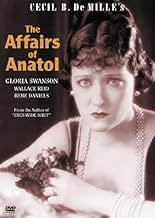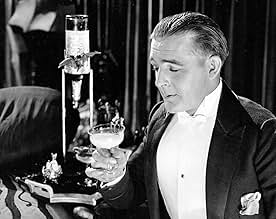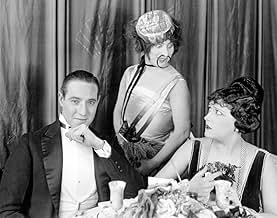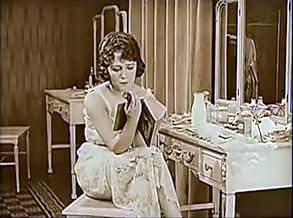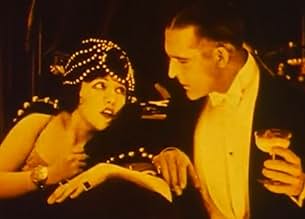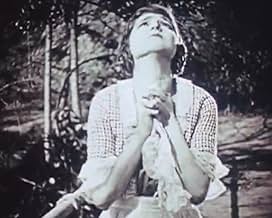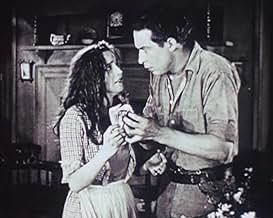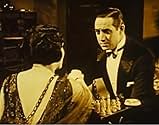Anatol Spencer, homme de haute société, se querelle avec Vivian, son épouse, et flirte avec Emilie qu'il a connue dans sa jeunesse. Il l'installe dans un appartement mais découvre qu'elle le... Tout lireAnatol Spencer, homme de haute société, se querelle avec Vivian, son épouse, et flirte avec Emilie qu'il a connue dans sa jeunesse. Il l'installe dans un appartement mais découvre qu'elle le trompe avec un vieil homme riche, Gordon BronsonAnatol Spencer, homme de haute société, se querelle avec Vivian, son épouse, et flirte avec Emilie qu'il a connue dans sa jeunesse. Il l'installe dans un appartement mais découvre qu'elle le trompe avec un vieil homme riche, Gordon Bronson
- Réalisation
- Scénario
- Casting principal
- Récompenses
- 1 victoire au total
- Vivian's Maid
- (non crédité)
- Chorus Girl
- (non crédité)
- Guest
- (non crédité)
- Chorus Girl
- (non crédité)
- Tibra
- (non crédité)
- Bridge Player
- (non crédité)
- Dr. Johnston
- (non crédité)
- Great Blatsky - Violin Teacher
- (non crédité)
- Stage Manager
- (non crédité)
Avis à la une
This being a de Mille film, the costumes are of course fantastic; although it's actually not Swanson, the famous 'clothes-horse', who gets the best dresses here. Production values are elsewhere very high, as well, extending into beautifully-drawn title cards (in one case, with a live-action car actually driving across it!) and a lot of sacrificed furniture, while frankly, those jewelled flowers look almost worth losing a lover over...
But it's not all gloss and enjoyable silliness. There's some fine acting on display as well, not least from Wallace Reid as the well-meaning 'Tony' whose halo begins progressively to slip -- and, in a couple of telling little scenes, from Elliott Dexter as the overlooked best friend. (The little scene over the chessboard is a perfect illustration of the power of the silent screen: everything made explicit without a word.)
The picture's stage heritage shows up mainly in a few over-long title cards, where plot points are conveyed in one long 'speech'; at almost two hours in duration, it's also unbalanced in the direction of the first half, which could almost stand as a film on its own without its briefer 'sequels'. If Emilie is not to have a film of her own, there is perhaps a little too much time devoted to her.
But "The Affairs of Anatol" is well worth seeing -- not least, as an eye-opener for those like myself who associate C.B. de Mille with vast Biblical epics. This piece of froth and frivolity has more of the charm of a Harold Lloyd movie minus the slapstick; one can really see why 'handsome Wallace Reid' was a star; and there are just enough well-judged moments of genuine feeling among the spectacle and satire to make us care about the various minor players.
The first rescue is of "a bubble-head jazz girl" named Emilie (Wanda Hawley) who is clearly a gold digger, She has poor old Gordon (Theodore Roberts) in her pocket but decides to go after Anatol who thinks he can redeem the poor girl. Meanwhile all she wants is a new victim. There's a great scene of redemption when Anatol tells Emilie she must throw away all her jewels in order to be cleansed. She immediately empties her jewel boxes and puts the empty boxes in a valise. They drive to the river where she throws away the empty boxes. Foolish Anatol believes her but learns the sad truth when he interrupts a wild dinner party Emilie is throwing.
Off to the country for purity and clean air, Anatol and Vivian are rowing in a river when a simple country girl Annie (Agnes Ayres) throws herself off a bridge. They dredge her out and revive her but Annie finds Anatol's wallet on the ground and steals it. After she is "saved" she runs home to husband Abner (Monte Blue) and replaces the money she stole from his church collection box. So much for country purity.
Back in the city Anatol decides to go out on the town, so Vivian decides to wear her :lowest gown" and "highest heals" and go out as well. Anatol falls into the clutches of the notorious nightclub star Satan Synne (Bebe Daniels) who lures Anatol into her den called "the Devil's Cloister." In the middle of vamping him, she gets a couple phone calls. It seems her husband is undergoing an operation for wounds suffered during the World War. When Anatol learns the truth, he gives Satan the money she needs to save her husband.
But back home, he finds Vivian has not come home from her night of clubbing. When she and Max finally come in a 9 AM he demands to know if she's be unfaithful. She refuses to answer. At that moment, a famous hypnotist (Theodore Kosloff) arrives and is compelled by Anatol to secretly put her in a trance and answer his questions. He does, but Max pleads with Anatol that to do this will forever ruin his marriage no matter what the answer is. Will Anatol force the issue? Reid and Swanson are terrific here as the stars, but the fallen women, Hawley, Ayres, and Daniels, all come off well also. Dexter and Blue have little to do. Roberts fumes and Kosloff looks mysterious. And yes that's Polly Moran as the nightclub entertainer.
The film has beautifully colored title cards and boasts nice tinting throughout. This is a must for silent film fans and was an important film for superstars Gloria Swanson, Wallace Reid, and Bebe Daniels.
However, the film could easily have been a half hour shorter with less wear and tear on the viewer and with virtually little loss in the morality tale or sense of the work. It's all enjoyable but it does drag a bit.
Grapevine and Kino both have excellent prints. Important for its director and his non-epic style as well as for the presence of Reid and Swanson, but far from a great or important film.
A long, involved, romantic and slightly moralizing movie about a really good hearted man caught between two women. That's the reason to watch it, that and Gloria Swanson in the lead as the wife. The other woman (Wanda Hawley) is a bit of a siren, and our good fellow is trying to be a charitable fellow with her, and only gets himself in trouble. She plays him like a child.
The year, 1921, is just at the point where the silent film is solidifying and getting sophisticated in a modern sense. There is still a lot of static (fixed) camera in this one (even though one of the photographers was the legendary Karl Struss). This puts the emphasis on the acting, which rises to the occasion. The copy I saw had some great hand colored title cards and some scenes that were toned in rich yellows or other colors, which made it all quite fun. The conflict between the two women, and the intrusion of another man or two, make this a classic soap opera kind of drama, well done and clear enough to follow once you get the basic flow. There are sort of two halves, and the second part out in the country is a nice shift even though the theme remains similar.
Of interest? The director, Cecil B. De Mille, had a hugely influential and long career, and this is toward the beginning, and it shows his tendency to find the popular themes that audiences would connect with, rather than push technical or aesthetic boundaries. Some might call him a populist, interest above all in success, but he was an expert director who knew how to make a movie really coherent, handling the story and actors with precision and a sympathetic feel. And the subject matter here is actually a bit edgy--a married man hanging out with a woman in her most intimate spaces. The play of the "bad" woman against the "good" one is a little expected, of course, but it's such a heartwrenching problem for this nice guy who just wants to help (or so he says), it's painfully enjoyable to watch.
However, it was very much the DeMille way to introduce his characters in bits, summing them up by focusing us on some tiny yet significant feature. Shortly before the entrance of Miss Swanson's foot, we meet Wallace Reid's impatiently shuffling boots and tapping fingers. By doing this DeMille gives us an impression of the man before we even see his face. And throughout this picture, we can see DeMille has a kind of "inside-out" approach to shooting a scene. Cinematic convention, even back then, was generally to start with a master shot, then draw us in on the details. DeMille begins with the minutiae, then gradually reveals the bigger picture. Take the dancehall sequence where Reid meets the subject of his first affair. We first of all see Reid's view of Wanda Hawley, as if she were seated alone at the table. It is only after her character has been established that we see a shot from a little further back, showing us she is in the company of a lecherous old Theodore Roberts! DeMille's process of gradual revelation especially applies to the splendour of a set, such as the giant fan being pulled aside to reveal a stunning backdrop of stars later in the same scene.
The purpose of all this is not only to make the picture visually attractive and smoothly paced. DeMille was one of the best at this time when it came to representing the thoughts of his characters. When Reid first sets eyes on Hawley, she really is all he can see, with Roberts being an unimportant distraction. At any one time, DeMille is showing us the focus of the protagonists, without often resorting to anything so subjective as a point-of-view shot. It is a subtler equivalent to the superimpositions of imagined figures or objects that he employed in his earlier pictures. With this canny cinematic approach you'd hardly know you were seeing an adaptation of a thirty-year old stage play.
Speaking of which, the original Affairs of Anatol was a popular comedy, and the jokes in theatre productions tend to be in the words, so how to translate it to the silent screen and keep in the comedy? DeMille was no master of slapstick, and his cast were certainly no clowns. However what remains from the original is a kind of growing sense of unlikely silliness, as opportunities for adultery continually appear in Reid's path, only to be flattened by unexpected twists. The world in which the story takes place is so shallow and dignified that these daft situations – slight exaggerations of typical melodramatic plot turns – just about pass for humour.
But the fact that it works at all is largely down to the efforts of the cast. Wallace Reid goes through it all with such po-faced seriousness, and the sober and dedicated manner in which he undertakes his infidelity is actually rather funny. The highlight is surely the appearance of Agnes Ayres and Monte Blue, who act out their little slice of melodrama without even a pretence of sincerity. It is perhaps the most frivolous moment of any DeMille film, and given its place among the familiar DeMille trappings, even Ayres jumping in the river in a suicide attempt looks like a gag.
Sadly, the only cast member who does not seem quite at home here is Gloria Swanson. She is essentially an air-headed young bride, giving her errant husband an unfeasible number of chances, and frankly the role is beneath her. Here and there she gets to show her powerful dramatic presence, but she becomes a somewhat marginal figure as the titular affairs take centre stage, and her talents are largely wasted. After giving impressive turns in several of his biggest hits, this was to be the last of her collaborations with the director. It seems that in DeMille's eyes, Swanson had become little more than a beautiful pair of feet.
Le saviez-vous
- AnecdotesGloria Swanson admitted in an interview decades later that Wallace Reid's drug addiction scared her while they were making this film, and she avoided socializing with him because of it.
- GaffesIn the flashback sequence where Emilie is on a swing and two mirrors are set up to give repeated reflections of the action, the cameraman bending over his camera is visible a few times when the swing moves out of the way.
- Citations
Anatol Spencer: Let's not kiss any more, dear, until after breakfast.
- Versions alternativesFilm Preservation Associates copyrighted a version in 1999 with a music score compiled and performed by Brian Benison. It was produced for video by David Shepard and ran 117 minutes.
- ConnexionsEdited into Faut-il avouer? (1921)
Meilleurs choix
Détails
- Durée1 heure 57 minutes
- Mixage
- Rapport de forme
- 1.33 : 1
Contribuer à cette page


